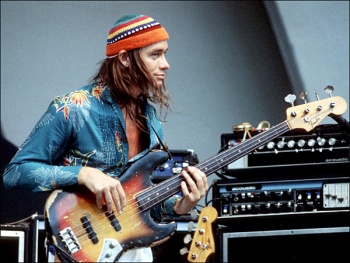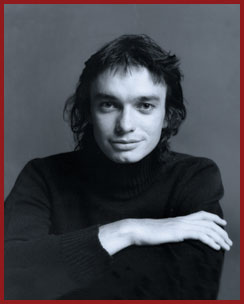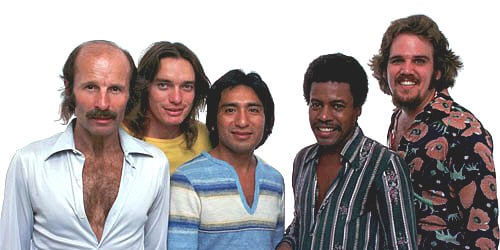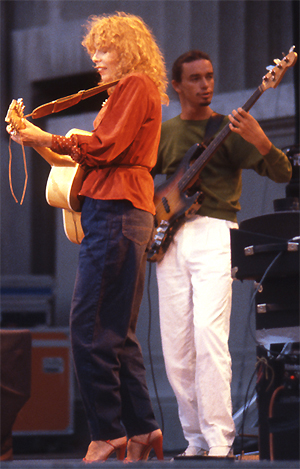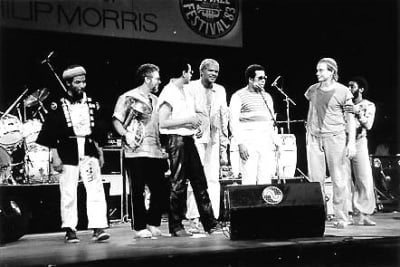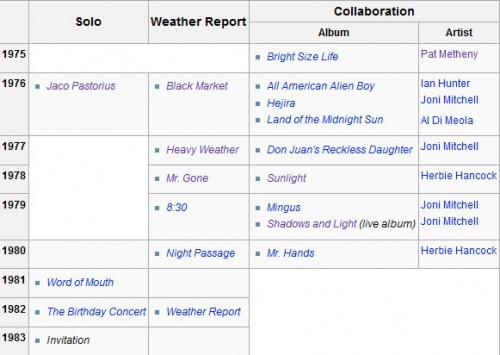Jaco Pastorius
Jaco Pastorius (born John Francis Pastorius III) was one of the most influential electric bass players in all times. He inspired a whole generation of bass players with his unique sound and an extremely good technique. He is most known for his work with fusion pioneers Weather Report and his own band Word of Mouth. He was killed in a bar fight 1987, and is an all-time legend amongst all serious bass-players. He was born in Norristown, Pennsylvania on December 1, 1951, but the family moved to Fort Lauerdale, Florida when he was about 7 years old. He died September 21, 1987 after the injurys in the bar fight.
Contents |
Childhood
Jaco was one of three sons in the family of John Francis Pastorius II and Stephanie Haapala Pastorius. He had Finnish, German, Swedish, and Irish blood in his veins. In school he was very fond of sports, especially basketball, which also gave him his nickname. Jaco and his father used to watch basketball together, and by that time a player named Jocko Conlan was around. Some adopted this and started to call Jaco for "Jocko", which later on was changed to Jaco when a friend from France called him Jaco in a letter. Jaco dug the spelling, and used that instead after this.
Like his father he adopted music at an early age and similar to his father he played stand-up drums, but switched to electric bass at 15 when a wrist injury stopped him from playing drums. It is no coincidence that he's outstanding rhytmic approach on the electric bass came from playing drums at an early age. His father was also a big band singer, and Jaco stated several times in interviews that Frank Sinatra was one of his early influences.
Another story tells that he actually was a drummer, but got booted by another drummer and the band needed a bass player, so therefore Jaco switched to electric bass.
His early influences according to himself included James Jamerson, James Brown, The Beatles, Miles Davis, and Stravinsky. Favourite bass players included Jerry Jemmott, James Jamerson, Paul Chambers, Harvey Brooks and Tommy Cogbill. He stated in an interview that singers was his biggest influence - "they have the ability to get personal".
Early career
Jaco started to play with local bands and was jamming late nights with visiting rhythm & blues artists, and soon got a reputation as a "local hero". One of his first real bands was Las Olas Brass, which was a nine-piece brass band playing covers of Aretha Franklin, Wilson Picket, Otis Redding and James Brown.
Jaco was gigging a lot with Wayne Cochran and The C.C. Riders, which he also wrote music for. He was also appearing on local R & B / Jazz recordings with artists such as Ira Sullivan's Quintet and Woodchuck. he also met big-band leader Peter Graves and started to write arrangements for big bands, which later in his career was reflected by his own band "Word of Mouth".
When he was nineteen, his oldest daughter was born and he stated: "I started playing the bass because it was so easy, and then I had to go and make it hard for myself. When I was nineteen, my daughter was born, and I gave up music". That was actually not true, since he continueed to play nearly every night and actually made his living out of music.
Meeting the right people
In 1974 he met Pat Metheny, who was studying at the University of Florida. They became close friends and were jamming a lot together and discussing music late nights until the sunrise. At this time he also met drummer Bobby Colomby (Blood, Sweat & Tears) who was searching for new talents for CBS Records.
Weather Report with Joe Zawinul was playing in Miami, and as stated by Zawinul Jaco came backstage after a show, telling him "It was alright, but I've expected more". Zawinul was telling the young musician to "getta hell out of here", but Jaco persisted Zawinul to listen to a demo-tape and the two of them started a conversation. Jaco was never a man of small words, neither considered as shy but his friends reported that's the way he was - always telling what he actually thought.
One of the first "real" records Jaco made was with Paul Bley, Pat Metheny and Bruce Ditmas entitled "Jaco". He was also teaching at Frost School of Music.
When Pat Metheny got the opportunity to record his first album "Bright Size Life", he asked Jaco and drummer Bob Moses, to join him on the record. After this album, which was a breakthrough in the world of modern jazz and were highly acclaimed, Jacos stardom was grewing rapidly.
Joining Weather Report
After Pat Metheny moved from Florida, Jaco was invited to New York by Joe Zawinul to rehearse with Wether Report, one of the biggest so called Jazzrock bands at that time. Jaco and Pat Metheny always said that they hated the label "Jazzrock" since none of them liked to put a label on music. Ironically, both was/is considered as leaders of the genre.
Jaco was hired in Weather Report by Zawinul (replacing Alphonso Johnson), and they recorded the legendary "Black Market" -album 1976, he was present on two of the songs. Ironically, it is reported that Jaco never touched drugs before N.Y and Weather Report, but it is believable that his widely known drug abuse started when he joined Weather Report.
The same year his first solo-album was recorded by Bobby Colomby, entitled just "Jaco Pastorius" and featured stars like Herbie Hancock, David Sanborn, Lenny White, Don Alias, and Michael Brecker among others. The other musicians merely acted as back-up musicians and the album is considered as one of the finest ever in the history of the electric bass. The album features Jacos version of "Donna Lee" - a Charlie Parker tune, as well as "Continuum" which showcases Jacos unusual (by that time) technique using harmonics creating chord voicings on the bass. This release made Jaco Grammy-nominated for both "Best Jazz Album " and "Best Jazz Soloist", and now Jaco's name was on everyones tongue.
He also recorded with Al di Meola and Ian Hunter, but most noticeable is his work on Joni Mitchell's album "Hejira", where he seems to use the bass as a human voice rather than a back-up instrument.
Heavy Weather and Teen Town
In 1977 the most succesful album of all times from Weather Report was recorded. Several of the tunes was co-written with Zawinul and he also got co-producing credits. On his own composition "Teen Town", he even played the drums by himself. The album opens up with "Birdland", that is one of the most well-known songs in this era. The album was one of Columbias top-sellers and still is in this genre.
By this time his illness started to show. Zawinul had offered Jaco a drink before a gig, and Jaco was behaving strange. Zawinul later said that he was'nt responsible for Jacos alcohol abuse: "I gave Jaco a drink one time. If one drink does it, you're a goner anyhow - believe me."
Jaco was diagnosed "Bipolar disorder", which is also known as "Manic Depression" in 1982, but according to his relatives & friends he had the symptoms long before. It is also widely known that this disorder in some phases makes the patient extremely creative.
The same year he followed up his work with Joni Mitchell on the album "Don Juans Reckless Daughter". He was also featured on an album from the jazz day's in Berlin with Albert Mangelsdorf and Alphonse Mouzon.
Working full time
By now Weather Report was one of the biggest bands in the world of Jazzrock/Jazz and were constantly touring. Jaco was trying to spend time with his family, recording with other artists and writing music at the same time. He stated in a interview at Hammersmith in London 1978:
"I'm a father, my daughter's almost eight, and from when she was born, I've had no time to listen to music, so I don't know that much about what's going on. I knew Miles Davis' music and Coltrane, and James Brown and The Beatles. I know that stuff dead, Frank Sinatra's too; that was what I was listening to, but once my kids were born I was working around the clock, didn't have time to listen to music."
The same year Weather Report was releasing "Mr.Gone", which was a minor success compared to "Heavy Weather". The album was according to Downbeat "overproduced" and is best known for it's one-star rating. Jaco was also featured on Flora Purim's album as well as Herbie Hancock's "Sunlight".
In 1979 Wether Report returned to their preceeding style and recorded "8:30", which again was a critics success and continued touring. The album was a live recording, even that the last three songs was studio recordings. Jaco's drug abuse has rised and he was sometimes hard to co-operate with. He complained to a journalist: "Why do me and my friends have to travel to Europe to make a living? The lucky one's are those who can stay at home and still make a living".
Jaco continued his collaboration with Joni Mitchell, and he was present on both "Mingus" and "Shadows and Light" (which is the live version of "Mingus) Actually he toured with Joni Mitchell in 1979 together with friend Pat Metheny and other top musicians. In 1980 he recorded with Herbie Hancock again, as well as touring with Weather Report. A bootleg with Mike Stern from the club Old York has been released after his death.
Weather Report recorded a new studio album in 1980 entitled "Night Passage", the album was recorded in L.A in just two day's live in the studio and is an excellent example of the musicians ability to perform/improvise. (they were criticized in the press for playing too much "arranged") By this time Jaco had severe drug problems and Zawinul and he could'nt get along anymore, even that it officially was stated that he was leaving for making his own band. He had about one year earlier already been booted by Zawinul, but when Jaco showed up apologizing at his doorstep in the middle of the night, Zawinul took him back.
Word of Mouth
Jaco had a recording contract with Warner Brothers, and his idea about a big band project was released in 1981 and was entitled "Word of Mouth". The record shows another side of Jaco as a musician, on the release his own playing was not so remarkable and the focus was more on the compositions. Guest musicians included superstars as Herbie Hancock, Wayne Shorter and Peter Erskine, harmonica virtuoso Toots Thielemans and Hubert Laws.
In the end of 1981 he celebrated his birtday with his friends in Fort Lauerdale, the event was recorded and was later to be known as "the Birthday Concert". In 1982 he took the Word Of Mouth big band on a world-wide tour with Japan as the highlight. From Japan came also the first reports of his irrational behaviour. He said to have shaved his head and painted his face black, and then throwed his bass in Hiroshima Bay.
When he got back from Japan, his second wife Ingrid, got him into hospital due to the Florida Mental Health Act. He was diagnosed Bipolar disorder and received Lithium to stabilize his moods. In 1982 the Weather Report album "Weather Report" was released, even though it was recorded in 1981 before Jaco left Weather Report. The same year (1982) he was working on an album "Holiday for Pans", but was too ill to complete it. It was later widely bootlegged and later bass player Kenny Burrell Jr. confessed to have done all the bass parts.
Jaco's life was now a complete mess, he got kicked from Warner and appeared only on some low-budget productions with Bireli Lagrene and Mike Stern. The drugs/alcohol was running his life and his wife divorced him. In 1986 he lost his apartment in N.Y, where he had been living since 1984, and begun to live on the streets for weeks. He's former wife Ingrid and his brother Gregory got him into hospital in N.Y where he was prescribed another medication for his mental illness. In december the same year, he moved back to Fort Lauderdale, continueeing living on the streets.
The End
A lot of tales and rumours has been written about Jaco's death. The truth is hard to know, but he attended a Santana concert and was kicked out from backstage, since he sneaked his way in. Later the same evening he tried to attend a club where the doorman (Luc Havan) rejected him. In anger he should have kicked in one of the glass doors which led to the fight, from which he had substantial injuries. He was taken to the Hospital, where he was in coma and a couple of days later a bleeding in his head caused him to be brain-dead. His family decided to let him die. Jaco Patorius became 35 years old and died on September 21, 1987. Havan, who was a karate-expert was later punished with 22 months in jail (he was released after four months, though). He wasn't convicted before and declared himself guilty to second degree of murder.
Jaco Pastorius was buried at Our Lady Queen of Heaven Cemetery in North Lauderdale.
Style
Jaco was for the electric bass, what Jimi Hendrix was for the electric guitar - a true innovator! He played with all his fingers on the right hand including the thumb with superb accuracy and timing. Even that he himself claimed a lot of times, that he never practiced (for more than a year, he had confessed), this seems to be untrue. He was introducing artificial harmonics, to create chord voicings on the bass and played the bass rather melodically than just simply playing a chords main note. He also used techniques like vibrato, slapping, arpeggios and was a true master of his instrument.
Equipment
Jaco started out on electric bass, but switched to an acoustic bass in 1968 when he got into jazz-music. Due to the humidity in Florida, the instrument care was problem, and he also hurted his wrist earlier. He switched back to the electric around 1970. He bought a Fender Jazz Bass, that was fretted, but took off the frets by himself in order to make it sound more like an acoustic bass.
He owned mainly two basses, a Fender Jazz Bass 1960 fretted and a 1962 Fender Jazz Bass 1962, also known as the "Bass of Doom". Both of the basses were stolen in 1986 when he were at Bellevue hospital, but they might as well been sold by Jaco himself in order to get some money for his living. The basses has been found since then. He used Rotosound strings and nearly no effects at all except for a MXR digital delay unit. He prefferred two Acoustic 360 amps and during his last three years of his life, he was using Hartke speakers.
Summary
There are rumours, tales, books, stories about Jaco's life. His long time friend Pat Metheny, states that the most of them are false, and even the book by Milkovsky (Down Beat) was turned down by Metheny and Jaco's family. What IS undoubhtable true is that Jaco was one of the finest bass players/composers of our time, and that he will be remembered in the history of music forever!
Videos
Discography
Official discography:
Videos:
1974
Pastorius, Metheny, Ditmas, Bley - video effects
1976 Weather Report - live in Montreux (Montreux Jazz Festival) French TV broadcast Weather Report - live in Montreux - alternate broadcast with a bonus track
1977 Weather Report appearance on "Midnight Special" U.S. TV broadcast
1978 Weather Report - Rockpalast Germany Weather Report - Reading, PN Weather Report - Washington, D.C.
1979 "Berliner Jazztage '79" - "Focus on Jazz" TV broadcast of Jaco's solo performance (Berlin) Weather Report - "Havana Jam" 5 min. montage from a documentary "Havana Jam" ... all-star finale jam with John McLaughlin and others ... 3 min. video clip Joni Mitchell - Shadows and Light (1980 release on Warner Home Video) *
1980 Weather Report - Beogradski Jazz Festival
1982 Aurex Jazz Festival 1982 (Japan) - Word of Mouth Big Band ... Japanese TV broadcast "Festival International de Jazz de Montreal" (six-piece band at Montreal Jazz Festival, Spectrel Video) *
1983 Nice Jazz Festival, France
1984 "Live Under The Sky '84" Gil Evans Orchestra with Jaco ... Japanese TV broadcast
1985 "Jeff Berlin" (instructional video) ... brief excerpt of Jaco and Jeff soloing on "Invitation" *
1985 "So What?" - Jaco Pastorius Band ... Belgium TV broadcast
1985 Jaco Pastorius - "Modern Electric Bass" (instructional video) *
1996? BET "Jazz Central" broadcast ... Jaco tribute ... host Lee Mergner interviews Bill Milkowski, Marcus Miller, Peter Erskine



